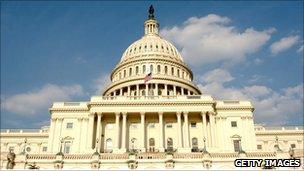US Senate votes to extend Patriot Act measures
- Published

The US Senate has voted to extend controversial surveillance powers granted by the Patriot Act law, put in place after the 9/11 attacks.
By a vote of 86-12, the Senate approved a 90-day extension of wiretaps, access to business records and surveillance of terror suspects.
The move came one day after the House of Representatives voted to extend the provisions until 8 December.
The White House backed the bill, but would have favoured a longer extension.
The House and Senate must now reach a compromise on extending the surveillance powers, which are set to expire on 28 February.
The brief extension gives those in Congress a chance to review the measures that some claim are unconstitutional infringements on personal liberties.
'Roving surveillance'
The provisions covered under the bill give the US government the authority for "roving surveillance" of suspects who might be able to thwart investigative methods that ordinarily require a judge's warrant.
They also give federal investigators access to business records with a warrant from a secret national security court and grant federal law enforcement greater power to watch foreign so-called "lone wolf" terror suspects.
The Patriot Act was shepherded through Congress by President George W Bush shortly after the terror attacks of 11 September, 2001.
Mr Bush and other supporters argued that the legal safeguards traditionally granted to criminal suspects left the US ill-protected against further attacks.
- Published15 February 2011
- Published9 February 2011